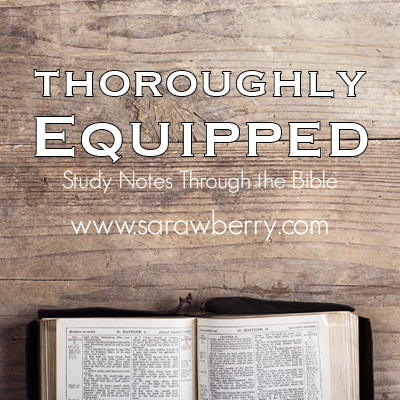Today’s reading is Numbers 15:17-16:40, Mark 15:1-47, Psalm 54:1-7, Proverbs 11:5-6.
In Numbers 15 we read again of sacrifices to be made in the event a person sinned. There were many sins considered, but the one that stands out to me in this chapter was the sin of forgetting the Sabbath. The Sabbath was to be received as a gift, and yet many saw it as an obligation. We often still feel this way. But the Sabbath is a gift for our benefit and for His glory. Even if we felt we didn’t need it, we should observe it and keep it holy simply because the Lord God, Creator of the Universe said to.
It is the mercy and grace of God that He provided in such detail the provisions for forgiveness of sin He knew the people would commit. But what if they didn’t sin so much? Often, the sins were not deliberate. Many could have been summed up as unholy forgetfulness. And so, He gave instructions for a reminder. It was a blue tassel.
37 Then the Lord said to Moses, 38 “Give the following instructions to the people of Israel: Throughout the generations to come you must make tassels for the hems of your clothing and attach them with a blue cord. 39 When you see the tassels, you will remember and obey all the commands of the Lord instead of following your own desires and defiling yourselves, as you are prone to do. 40 The tassels will help you remember that you must obey all my commands and be holy to your God. 41 I am the Lord your God who brought you out of the land of Egypt that I might be your God. I am the Lord your God!”
Numbers 15:37-41
The people, not just the priests, were to make tassels for the hems of their clothing and attach them securely with a blue cord. When they saw the tassels they would remember to obey the commands, remember to obey instead of following their own desires, as they were prone to do. As we, too, are prone to do. I picture the tassels blowing in the wind, I picture the tassels moving as they walked—wherever they walked. And the movement of the tassels would cause them to remember the Lord their God. The Lord repeated himself three times when he described why they should remember: “I am the Lord your God…that I might be your God…I am the Lord your God!”
Think for a moment about the blue cord. Do you remember what the color blue represented? Blue represents the heavenly things. It describes the sky, Heaven, and the Holy Spirit. We need to be reminded of the heavenly things, the heavenly way. We may not wear tassels with blue cords to do that, but we do have the Holy Spirit, symbolized by the blue, to walk with us wherever we go.
On this Sabbath day, let’s make an effort to remember the Lord our God that we might not sin against Him. Let’s praise Him for His forgiveness and ask Him to send us reminders each day to follow Him instead of our own desires, as we are prone to do.
Come Thou Fount
Come thou Fount of every blessing; Tune my heart to sing thy grace;
Streams of mercy, never ceasing, Call for songs of loudest praise.
Teach me some melodious sonnet, Sung by flaming tongues above,
Praise the mount; I’m fixed upon it: Mount of thy redeeming love.
Here I raise my Ebenezer, Hither by thy help I’m come
And I hope, by thy good pleasure, Safely to arrive at home,
Prone to wander, Lord I feel it, Prone to leave the God I love,
Here’s my heart. O take and seal it; Seal it for thy courts above.
Jesus sought me when a stranger, Wand’ring from the fold of God,
He, to rescue me from danger, Interposed his precious blood,
/Prone to wander, Lord I feel it, Prone to leave the God I love./
O to grace how great a debtor Daily I’m constrained to be!
Let they goodness, like a fetter, Bind my wandering heart to thee
Prone to wander, Lord I feel it, Prone to leave the God I love.
Here’s my heart. O take and seal it; Seal it for thy courts above.


